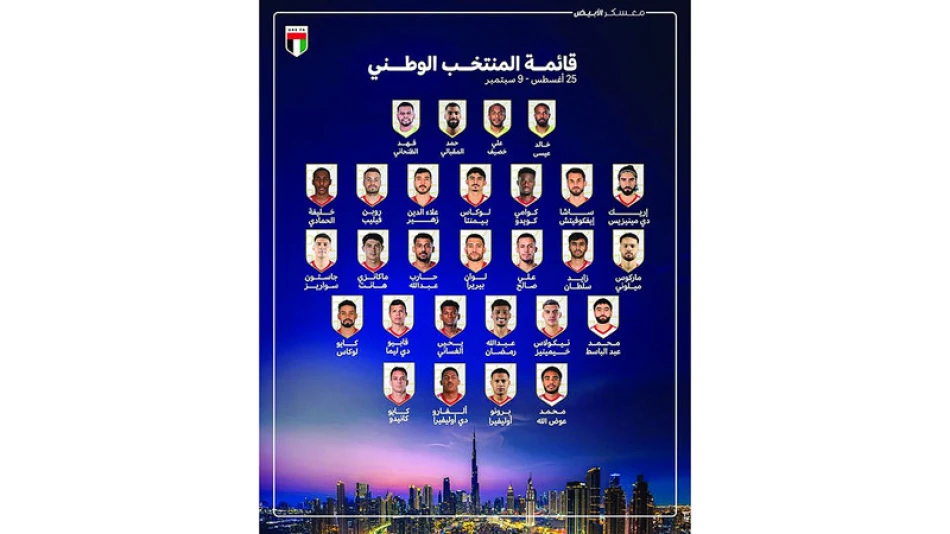
Egypt National Team Announces Limited Changes, Includes Debutant Mohamed Awad
UAE Football Squad Faces Make-or-Break World Cup Qualifying Campaign
The UAE national football team has unveiled a 28-player squad as they enter a critical phase of their 2026 World Cup qualifying campaign. With crucial matches against Oman and Qatar looming in October, coach Oláriu Cosmin is banking on tactical stability and emerging talent to secure the nation's first World Cup appearance since 1990.
Strategic Squad Changes Signal New Direction
The most significant addition to the squad is 23-year-old striker Mohammed Awadallah from Al Ain, who has been making waves during his loan spell with Polish club Lechia Gdańsk. His inclusion represents a broader shift toward integrating players gaining experience in European leagues—a strategy that has proven successful for regional competitors like Qatar and Saudi Arabia.
Cosmin retained 24 of the 29 players from the previous camp in Austria, suggesting a move toward squad stability after extensive experimentation. This approach mirrors successful World Cup qualifying campaigns, where consistency in selection often trumps constant rotation.
Notable Returns and Departures
The squad welcomes back Al Nasr duo Mohammed Abdulbasit and Zayed Sultan, alongside Baniyas goalkeeper Fahad Al Dhanhani. Their returns follow impressive domestic performances in the early rounds of the ADNOC Pro League.
However, several established players face the axe, including Al Ain's Yahya Nader and Al Jazira's Richard O'Connor, signaling that domestic form now carries significant weight in selection decisions.
World Cup Dreams Hang in the Balance
The UAE's World Cup qualifying journey has been marked by near-misses and heartbreak. Their last appearance in 1990 remains a distant memory, while regional rivals have surged ahead. Qatar's 2022 World Cup hosting and Saudi Arabia's recent investments in football infrastructure have raised the competitive bar significantly.
The upcoming matches against Oman on October 11 and Qatar on October 14 represent more than just qualifying fixtures—they're a test of whether the UAE can compete with the Gulf region's emerging football powers.
Preparation Strategy
The team's Dubai training camp, running until September 9, includes friendlies against Syria and Bahrain at Al Wasl's Zabeel Stadium. These matches will serve as crucial tune-ups, allowing Cosmin to finalize his tactical approach and assess player combinations under match conditions.
Regional Context and Competitive Landscape
The UAE's qualification campaign unfolds against a backdrop of significant regional football development. Saudi Arabia's substantial investment in player development and Qatar's post-World Cup momentum have created a more competitive Gulf football environment.
The inclusion of naturalized players like Caio Lucas, Bruno Oliveira, and Álvaro de Oliveira reflects a broader regional trend of countries leveraging international talent to strengthen their squads—a strategy that requires careful balance between imported skill and local development.
Stakes Beyond Football
World Cup qualification carries implications beyond sport for the UAE. Success would validate the country's significant investments in football infrastructure and youth development programs, while potentially boosting the nation's soft power profile ahead of other major sporting events.
For coach Cosmin, the campaign represents a defining moment in his tenure. The Romanian tactician's emphasis on squad stability suggests recognition that previous tactical experimentation must now yield to results-focused pragmatism.
The October fixtures will ultimately determine whether the UAE's latest World Cup qualifying attempt follows the familiar pattern of disappointment or breaks new ground toward football's biggest stage.
Most Viewed News

 Sara Khaled
Sara Khaled






